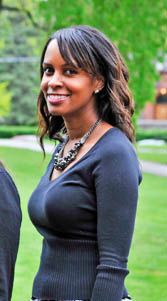
This semester, the University’s Counseling and Psychological Services (CAPS) is reintroducing the Healing Forward: Self-Care for Survivors of Sexual Violence support group. This group will meet every Tuesday from 5:30 to 7 p.m. for the next nine weeks.
The group was originally launched in the spring of 2014 with the intention that every session would have its own goal. Primarily organized by Sexual Violence Resource Coordinator and Therapist Alysha Warren, each of the nine sessions aims to help female-identified survivors of sexual assault with the healing process and will focus on a different aspect of sustainable self-care practices.
Warren discussed the objective of making this group available at the University.
“The focus is on expanding the definition of self-care beyond activities and more into practices like self-compassion, mindfulness, creativity and play in addition to others,” Warren wrote in an email to The Argus. “The group is ideal for students who have had a sexual violence experience and are looking for tools and strategies to move forward.”
Sessions will include a variety of art and movement activities, while broaching topics such as self-compassion, mindfulness and meditation, and why self-care matters. The activities strive to create a medium for sexual assault survivors to connect with other students who have had similar experiences.
“The first session is focused on building rapport between members and collectively setting up guidelines that help participants feel safer in the room,” Warren wrote. “The guidelines are a living document that can and do change based on the needs of the group.”
In addition to leading the sessions, Warren plans to sit down with potential participants prior to the first sessions to quell any anxious feelings.
“I meet with interested students individually to learn more about them, to answer any questions that they have and to check in to see if they have any concerns about coming into a group environment,” Warren wrote. “The intake session provides me with more information about each member and also ensures that members aren’t walking blindly into the group.”
In previous years, groups such as Healing Forward have received a great amount of positive feedback.
“I believe the sexual assault support group provides huge resources, and a real sense of peer support, in what can often be an isolating healing process,” said a student who wished to remain anonymous. “I joined the support group a year and a half after being assaulted. For me, it was the first opportunity I really had to get to know other survivors.”
CAPS attempts to create a safe space for members to share their thoughts and journeys. While some choose to cope privately, many survivors find solace in the sense of community created by such programs.
“I was continually inspired by the strength and perseverance of the other girls and I found great comfort in the acceptance, space, and companionship that group fostered,” the anonymous student said. “Every survivor follows their own path of healing, and that group played a huge role in my individual journey.”
In addition to Healing Forward, CAPS also offers a variety of other support groups. In the past, they have provided male-identified survivors groups, yoga and self-care groups, and groups like “Experiences of Healing,” which focus on the aftermath of an assault.
“It’s common for students to start in the ‘Sexual Assault Support Group’ and then transition into the yoga group (when offered) or the self-care group,” Warren wrote. “In the Sexual Assault Support Group, students determine the topics that we discuss each week. The yoga and self-care groups follow a curriculum, which is flexible based on the needs and interests of the people in the room.”
Students who were not directly affected by sexual assault are also encouraged to play an active role in preventing this type of violence on campus.
Nikita Rajgopal ’17, the 2014-15 Sexual Assault Response Team (SART) intern, described some of the University’s programs meant to inform and empower those who wish to get involved.
“We did three all-school bystander intervention trainings last semester and some for specific groups,” Rajgopal said. “Those are really important because they are really the best way we have to prevent sexual violence since obviously people aren’t going to be there when a sexual assault is happening. Bystander intervention is there so people can step in when they see a lot of red flags that might not be well known.”
The University also plans to revise the current Title IX protocol with the goal of promoting program equity in sexual harassment and sexual violence issues.
“Last semester we did a campus-wide Title IX forum to get input on policy decisions that are being made,” Rajpogal said. “They’re working on completely revising Wesleyan’s policy and changing how the hearing for cases of sexual violence are heard and brought to investigators.”
Students who wish to participate in the Healing Forward support group should contact Alysha Warren at awarren@wesleyan.edu by Friday, Feb. 13 with the subject line “Healing Forward.”


Leave a Reply